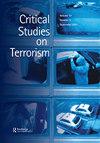Who’s afraid of the vulnerable terrorist? Framing violent jihadists’ life and intimate relationships
IF 2.5
Q2 POLITICAL SCIENCE
引用次数: 2
Abstract
ABSTRACT This article looks at a sample of academic articles in the field of terrorism studies and international relations to explore the ways in which marriage, sexual activity and close relationships in jihadist groups are framed, imagined and investigated. Despite the scarcity of research being conducted on the subject, this article reveals that, in the study of terrorism, the issue of intimate relationships is the object of two trends: on the one hand, the themes of sexuality and marriage are in fact present in the field, only exclusively through the lens of sexual victimisation, violence, abuse and romantic manipulation. On the other hand, intimate relationships are often dismissed as not being worthy of in-depth investigation when not related to violence. Together, these two interdependent trends create, using the words of Butler, a “silent and melancholic discourse”, which downplays the subjectivity, banality, and vulnerability of the life experiences of subjects involved in jihadist groups. Using the learnings of queer scholarship, the article posits that the ways in which the intimate life of individuals involved in jihadist movements are portrayed and ascribed a perverted characteristic matter in how vulnerability is distributed and how the subjects are apprehended in academia and beyond.谁会害怕脆弱的恐怖分子?描绘暴力圣战分子的生活和亲密关系
本文以恐怖主义研究和国际关系领域的学术文章为样本,探讨圣战组织中的婚姻、性活动和亲密关系是如何被框定、想象和调查的。尽管对这一主题进行的研究很少,但本文揭示,在恐怖主义研究中,亲密关系问题是两种趋势的对象:一方面,性和婚姻的主题实际上存在于该领域,只是完全通过性受害、暴力、虐待和浪漫操纵的镜头。另一方面,当亲密关系与暴力无关时,通常被认为不值得深入研究。用巴特勒的话来说,这两种相互依存的趋势共同创造了一种“沉默而忧郁的话语”,这种话语淡化了圣战组织中涉及的主体的主观性、平庸性和生活经历的脆弱性。通过对酷儿学者的研究,这篇文章认为,圣战运动中个人的亲密生活被描绘成一种变态的特征,这与脆弱性的分布方式以及学术界内外对这些主题的理解方式有关。
本文章由计算机程序翻译,如有差异,请以英文原文为准。
求助全文
约1分钟内获得全文
求助全文

 求助内容:
求助内容: 应助结果提醒方式:
应助结果提醒方式:


